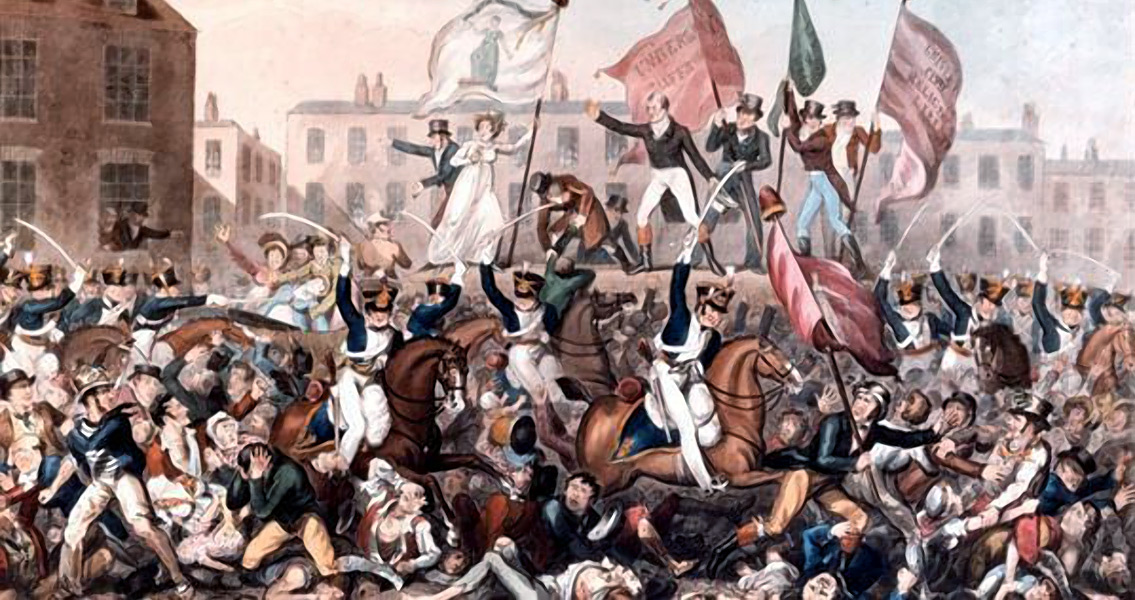<![CDATA[Eleven people were killed and around five hundred injured at a peaceful protest at St. Peter's Fields, Manchester on 16th August 1819, in an event now known as the Peterloo Massacre. The early nineteenth century was politically volatile in Britain, and Europe as a whole. In a world still coming to terms with the French Revolution, governments across Europe had to contend with more working class uprisings and demonstrations than ever before. Industrialisation's onset changed the make up of society. Cities expanded rapidly as populations converged on industrial centres. Employer-employee relations changed permanently as workers moved from agriculture to factories. Britain didn't experience the revolutionary upheavals that engulfed much of the continent through the course of the nineteenth century. Nevertheless, the Peterloo Massacre highlights both the massive protest movement in the country and the shocking lengths authorities went to in an attempt to suppress it. Since the end of the Napoleonic Wars civil unrest had been brewing in Britain; and a massive reform movement had formed in major cities, such as Manchester. The existing electoral system left much of the population disenfranchised, and pushed them into a campaign for universal male suffrage. As the country lurched from unemployment crises to food shortages crises, extending the vote seemed to many the best means to bring about real change. 1819 had been a particularly tough year, recession and rocketing food prices as a result of the controversial Corn Laws triggering a wave of demonstrations around the UK. The biggest came on 16th August. Estimates vary, but most historians claim somewhere between 60,000 and 100,000 protesters descended on St. Peter's Fields. The participants, there to hear speeches by Henry Hunt and other radical figures, were carrying signs calling for an extension of the voting franchise and repeal of the Corn Laws. All accounts describe a peaceful, well behaved protest. No one in the crowd was armed, and an insight into the kind of atmosphere can be seen in the fact that many protesters had brought their children. Despite this, local magistrates panicked. The Riot Act was read, essentially ordering the crowd to disperse, but it seems unlikely many heard it over the speeches and chants. In response the magistrates sent in the yeomanry: a force of volunteer soldiers, to arrest the speakers and leaders of the protest. Some sources allege that members of the yeomanry were drunk, other that they used the opportunity to try and settle personal grudges with protesters. Either way, they brandished sabres and attacked members of the crowd who had linked arms to protect the speakers. A crazed melee ensued. Who attacked who is lost in the mess of conflicting accounts, but the authorities' next step isn't. The magistrates deployed six hundred light cavalry soldiers to retrieve the yeomanry and break the protest. Ten minutes later, the protesters had all retreated and all that remained were the bodies of the killed or injured. The leaders had all been arrested, with Hunt sentenced to two years in prison. The name Peterloo was given to the brutal events as an echo to the recent battle of Waterloo, mocking the soldiers for having attacked unarmed civilians. The shocking, unjustifiable outburst of aggression from the authorities reveals their fear that an event like the French Revolution could have erupted in England. Close to two centuries later, historians consider Peterloo a vitally important step in the development of British democracy and affording ordinary people the right to vote. A tragedy which highlighted the excesses of authority and the desperation of the masses clamouring for electoral reform. ]]>
Soldiers Massacre Peaceful Protesters at Peterloo
